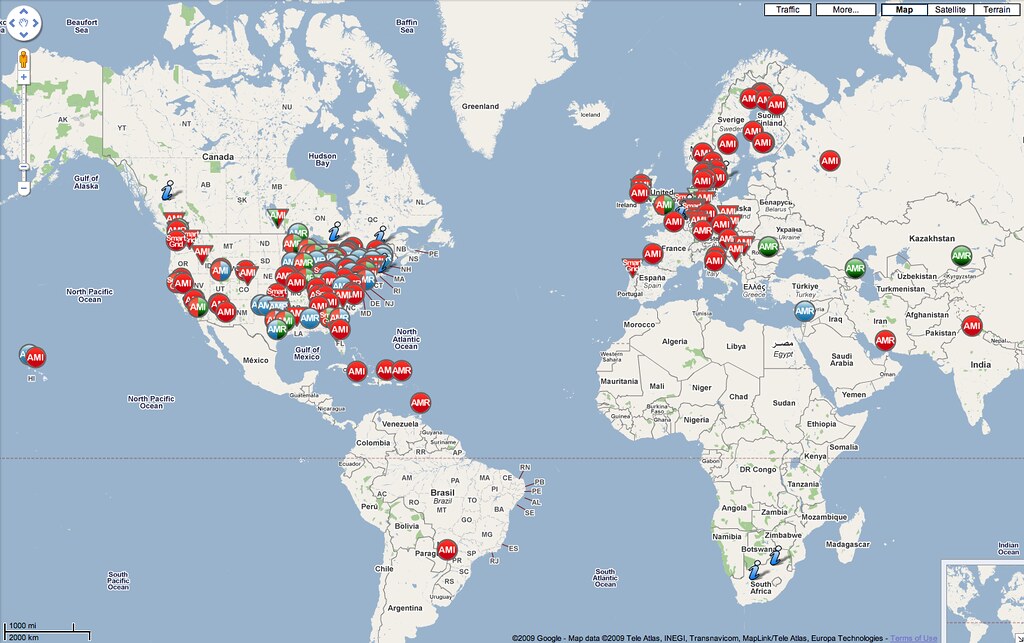-
BBC NEWS | UK | Scotland | Glasgow, Lanarkshire and West | Dong withdraws from energy deal
“Plans to build a coal-fired power station in Ayrshire could still go ahead despite a decision by one of the main backers to pull out.
Danish energy firm Dong said it would now act as a design partner for the station at Hunterston, next to British Energy’s nuclear plant. “
-
London’s new drinking fountains a challenge to bottled water industry | Environment | The Observer
“London may soon follow in the footsteps of Bundanoon, the Australian town that last week banned bottled water and set up drinking fountains for thirsty locals.
The capital’s first water stations will be set up this month in a move that could have serious repercussions for the £1.5bn-a-year bottled water industry, with companies finding it increasingly difficult to justify their carbon footprint as the quality of tap water improves.”
-
‘Scary’ climate message from past
“A new historical record of carbon dioxide levels suggests current political targets on climate may be “playing with fire”, scientists say.
Researchers used ocean sediments to plot CO2 levels back 20 million years.
Levels similar to those now commonly regarded as adequate to tackle climate change were associated with sea levels 25-40m (80-130 ft) higher than today. “
-
WWF – Saving forests five times better than carbon capture for climate action: WWF Sweden
“WWF Sweden is urging its government – holding the current EU Presidency – to get behind an effective international agreement on halting forest loss as a key and highly cost effective measure on climate change.
“Sweden should follow the examples set by its northern neighbors in developing systems to halt deforestation,” said WWF CEO General Lasse Gustavsson.. “One Swedish krona to stem deforestation results in the same emissions reductions as five kronor for the controversial carbon capture and storage technique,” “
-
“It would be “more than an embarrassment” to US President Barack Obama if the United States should fail to lead international climate negotiations to completion at a UN conference in Copenhagen in December, a senior European climate negotiator says”
-
Piano stairs – Rolighetsteorin.se – The fun theory
Here is one to cheer you up – fun can motivate people to do the right thing – who knew?
-
President Obama Declares October National Energy Awareness Month
“A more prosperous future for the US’s economy means making investments in energy efficiency and clean energy today. Well-funded energy research and development will not only help protect our environment and support our communities, but it will also address concerns of global competitiveness and national security.
Innovation in energy technology will decrease oil use, strengthen the economy, and reduce the dangerous pollution that causes climate change. “
-
RealClimate – Climate science from Climate scientists
A great blog on climate science from actual climate scientists!!!
-
“In order to meet the British commitments to cut carbon dioxide emissions, ”a step change in the pace of reduction is needed”, a government advisory group says in a new report”
From 2003 to 2007, British CO2 reductions averaged 0.6 percent a year. This needs to increase to two to three percent a year to meet the government’s carbon budgets, the British Committee on Climate Change (CCC) says in a new report Monday.
-
EDF nuclear waste stored in open air in Russia: report | Green Business | Reuters
“Waste from French power stations was being deposited in the open air in Russia, French newspaper Liberation said on Monday.
The paper said 13 percent of French radioactive waste produced by power group EDF could be found in the open air in a town in Siberia to which access is forbidden. The paper said it based its information on an investigation due to be broadcast on TV channel Arte on Tuesday.”
-
UK Greenpeace protesters scale roof of parliament | Green Business | Reuters
“Dozens of climate-change protesters climbed on to the roof of the Houses of Parliament on Sunday and unveiled banners, raising security concerns the day before legislators return from their summer break.”
-
New demands from the US – COP15 United Nations Climate Change Conference Copenhagen 2009
“A US demand that developing countries should set their entire emissions reducing actions under international scrutiny has been rejected as “non-negotiable” by the developing countries in Bangkok. “
-
Smart Grid: The Coming Smart Grid Data Surge
“the advancements of the Smart Grid are founded in information. Data is used to inform consumption, to make rates more dynamic, and to enable the next-generation power prosumer. In reading a recent piece on potentially mandated Smart Metering in the UK, the Telegraph raises the issue of data handling relative to today’s data management. In short strokes, 44 million homes were typically measured twice a year, making for 88 million entries for data. In the new system, every home is measured twice a day, meaning that those 88 million entries have now become over 32 billion.”
-
Smart Grid: The Smart Grid and Consumers: Unanswered Questions
In addition to the potential “prize” the Smart Grid might offer them, other consumer concerns must be addressed to gain their trust and comfort with the dramatic change the Smart Grid represents
-
Smart Grid: Google and Partner Offer Home Energy Management Without Smart Meters
“Google and Energy Inc. have partnered to provide a home power-measuring device that works with Google’s energy management software to give homeowners detailed information about their power consumption that can help them monitor and reduce energy consumption. “
-
“Cisco, together with utility, technology and local government partners, are developing some of the nation’s first projects to create a smarter electric grid. General Electric is also testing how smart appliances can help lower power demand in a pilot program at Masdar City in Abu Dhabi.”
Posted from Diigo. The rest of my favorite links are here.



